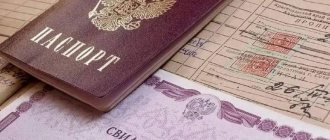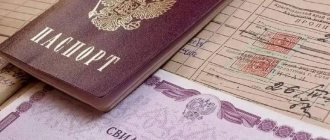It is so accepted that the fact of a person’s death does not happen without resolving bureaucratic issues. Relatives usually take care of the paperwork. In order to settle the last affairs of the deceased, citizens sometimes go through a chain of up to five instances. Undoubtedly, it is difficult at the moment associated with the loss of a loved one to also obtain the required documents. But if this is not done in time, then problems may subsequently arise for living citizens.
Content:
- Transporting the deceased to the morgue
- Medical report from the morgue
- Registration of a death certificate
- Death in another country or city
- Receiving burial benefits
- Certificate of burial
- Registration of inheritance
When faced with the loss of a loved one, not everyone knows what to do in such a situation, what documents need to be drawn up after death, or how to properly organize a funeral ceremony. In moments of trouble, it is easy to get confused, because many papers should be collected in the first days after death. In this article, we tried to collect for you the most important information on preparing for a burial and tell you about all the features of preparing documentation for a funeral.
Transporting the deceased to the morgue
If a person died at home, immediately after death the relatives need to call an ambulance and the police. Upon arrival, the staff will inspect the body and provide several documents that will be required later when organizing the funeral. Emergency doctors write out inspection and death certificates, and law enforcement officers write out a body examination protocol. If the police have doubts about the cause of death, the deceased may be taken for a forensic examination. If a violent death is discovered, a criminal case will be initiated. If a person dies naturally, a decision is made to refuse to initiate a case. In any case, the body can be collected only with written permission from the prosecutor's office or the police.
Registration of a death certificate
The mandatory list of documents after death includes a certificate from the registry office, which confirms the death of a person. It is drawn up on stamped paper and provided to relatives free of charge. To obtain a certificate, you must visit the registry office with the following package of documentation:
- passport of the responsible person;
- medical certificate of death from the morgue;
- ID of the deceased;
- application in form No. 16 (drawn up at the registry office when issuing a certificate).
The document is issued on the same day of application. Recipients can be relatives or legal representatives. Based on this, further preparations for the burial can be carried out. The paper will be required when registering a grave in a cemetery, carrying out cremation, receiving benefits and payments for burial, as well as when entering into inheritance rights.
Why is this document needed?
Not all people fully understand that this document is extremely important. The presence of such a certificate gives relatives the following opportunities:
- obtain a certificate that a relative has died. Such a certificate helps resolve a fairly large list of controversial issues that have arisen after death, which will relate to both inheritance and the division of movable and immovable property;
- The document will allow you to receive financial assistance from the state for burial. This document is also important if you need to apply for a survivor’s pension;
- When signing a contract with funeral services, such paper is also required. This item includes providing a place in the cemetery and holding a funeral procession.
Attention!
If the document was lost or destroyed, then you must take a duplicate from the registry office.
Death in another country or city
The death of a person in another city or state is a separate case that requires the collection of a large package of documentation according to the characteristics of the region. As a rule, the hospital where the deceased died is responsible for issuing a medical certificate in such a situation. To deliver the deceased to his hometown, you will need to organize the transportation of “cargo-200”. For such a service, it is advisable to contact specialized funeral companies.
To transport a body by plane, you must prepare the following documentation:
- death certificate;
- certificate of embalming;
- SES certificate;
- a document confirming the absence of foreign objects in the coffin;
- ID card of the accompanying person.
In the event of death abroad, all questions regarding transportation are taken over by the consulate. For transportation, you will need the deceased's passport, his visa (if available), and a medical death certificate indicating that the person died abroad.
Receiving burial benefits
Any person who has assumed the responsibility for conducting a funeral has the right to receive social benefits from the state. Its size is set by local authorities and may vary in each region of the Russian Federation. Payments are made on the day of application based on the following documentation:
- application for benefits;
- death certificate;
- applicant's passport;
- death certificate;
- Bank details for transferring funds.
The application must be submitted no later than 6 months from the date of death. You should apply for benefits to the organization according to the status of the deceased. So, if a person was working at the time of his death, the funds are paid at the place of his employment. If the deceased was unemployed, the application is submitted to the social protection department at the place of registration, for pensioners - to the territorial division of the Pension Fund of the Russian Federation. The military commissariat is responsible for issuing benefits for military personnel.
Legislation
Federal legislation
- Federal Law of November 15, 1997 No. 143-FZ “On Acts of Civil Status”
- Federal Law of June 23, 2016 No. 219-FZ “On Amendments to the Federal Law “On Civil Status Acts”
- Federal Law of December 29, 2017 No. 438-FZ “On amendments to certain legislative acts of the Russian Federation regarding the state registration of certain acts of civil status in multifunctional centers for the provision of state...
- Federal Law of December 29, 2017 No. 472-FZ “On Amendments to the Federal Law “On Civil Status Acts” and the Federal Law “On Amendments to the Federal Law “On Civil Status Acts”
- Decree of the Government of the Russian Federation dated July 7, 2017 No. 807 “On approval of the Rules for the use of enhanced qualified electronic signatures when maintaining the Unified State Register of Civil Status Records and transferring them to electronic form...
- Order of the Government of the Russian Federation dated December 31, 2016 No. 2934-r “On approval of the list of information included in the civil status record, convertible (converted) into the form of an electronic document”
- Order of the Ministry of Justice of the Russian Federation dated October 1, 2018 No. 200 “On approval of certificate forms and other documents confirming the presence or absence of facts of state registration of acts of civil status, and Rules for filling out certificate forms...
- Order of the Ministry of Justice of the Russian Federation dated October 1, 2018 No. 201 “On approval of application forms for state registration of civil status acts and rules for filling out application forms for state registration of civil status acts”
- Order of the Ministry of Justice of the Russian Federation dated October 1, 2018 No. 202 “On approval of civil registration forms and Rules for filling out civil registration records”
- Order of the Ministry of Justice of the Russian Federation dated August 13, 2018 No. 167 “On approval of forms of certificates of state registration of acts of civil status and Rules for filling out forms of certificates of state registration of acts...
Registration of inheritance
If the deceased was the owner of a house or apartment, after his death the relatives need to enter into the rights of inheritance of property. Real estate and other valuables are transferred to loved ones by law or will. In both cases, the inheritance should be formalized within 6 months from the moment of transition to another world. To enter into inheritance, you must visit a notary and submit the appropriate application. Attached to the application:
- applicant's passport;
- death certificate;
- will (if any);
- an extract from the house register or personal account about the place of registration of the deceased;
- confirmation of kinship (in the absence of a will).
The application can be submitted in person or through a legal representative. In the latter case, a notarized power of attorney in his name will be required. In order for a notary to provide a certificate of inheritance, he must know what the deceased's property includes. For these purposes, title documents for real estate are attached to the application. In the case of a car, you need to have a vehicle passport, a car registration certificate, and a certificate of market valuation of the vehicle.
If you don’t know what to do after the death of a relative, what documents to collect for the funeral, contact the “Honest Agent” funeral service for help. Our specialists have extensive experience in organizing funeral events and are ready to take on all issues with documentation. We will help you quickly collect the necessary papers and conduct the burial of a deceased relative at a high professional level.
Tell your friends:
Obtaining a certificate
After the death of a father or other relative, it will be necessary to register this fact. Civil registry office employees have the authority to carry out these actions. In addition, registration is carried out at institutions providing medical services. The specified act is considered as basic; it contains information regarding the date and time, the place where the person died. Documentation is required in order to perform actions that are significant from a legal point of view.
Registration can be performed by persons related to the deceased or other citizens.
These activities can be expressed in the form:
- registration of papers related to the inheritance mass;
- discharge of the deceased from the apartment where he lived;
- visiting fiscal authorities to remove a person from registration.
The basis for obtaining the paper in question is a conclusion issued by doctors or a decision of a judicial authority. The last act is used in a situation where there is no news of a citizen for a five-year period. The document preparation process consists of several sequential steps. At the initial stage, the fact of death is recorded. This is done by employees of a medical organization. Then a certificate is issued indicating the presence of this fact. Information regarding the death of a person is sent to the registry office.
IMPORTANT !!! Persons interested in obtaining documentation contact the registry office, where they issue a certificate confirming the person’s death.
You can apply at the following location:
- where the deceased lived;
- place of death.
In the latter case, we are talking about organizations providing medical services. When the death of a person occurs on trains or planes, it is recorded by doctors on board or by hospital staff located in the nearest locality. Doctors and paramedics have the authority to record the death of a citizen. To obtain a certificate, you will need to write an application and send it to the registry office. At the beginning of the document the name of the body and the details of its head are indicated. Then the request for the issuance of a certificate is reflected and the purposes for obtaining the certificate are listed. For example, this may be the receipt of an inheritance mass.
IMPORTANT !!! The content part reflects information about the deceased, including his last name and initials, the day of death. You will need to indicate the details of the act through which the identity of the deceased was verified. When a citizen submits an application, he needs to attach a document confirming his identity and a receipt for payment of the state fee. The law reflects the magnitude. It is equal to 350 rubles. In addition, you will need a conclusion issued by doctors.
If you do not have the deceased’s passport, you will not be able to obtain the act in question. However, there are exceptions. If the passport has been preserved, then it must be handed over to the registry office employees. There are several options for contacting this authority. This includes a personal visit or through various sites. For example, through State Services. The latter method is convenient because the service can be accessed on holidays or on weekends.
To access Government services, you will need to have a verified account. In addition, the person must have an electronic signature. To undergo verification, you need to contact the registry office or partner offices. You must have a document with you that verifies the identity of the person. Electronic signatures are generated by authorized agency companies that specialize in their production.
ATTENTION !!! Please note that there is a charge for its production. You will need to pay about 3.5-6.5 thousand rubles.
Relatives of the deceased or representatives of the judiciary, the Ministry of Internal Affairs and other persons interested in this can apply for a certificate. The form of the document in question is reflected in the order issued by the Ministry of Justice under No. 142. The law reflects the time frame during which the issuance of primary documentation is implemented. The period ranges from 4 to 10 days.








